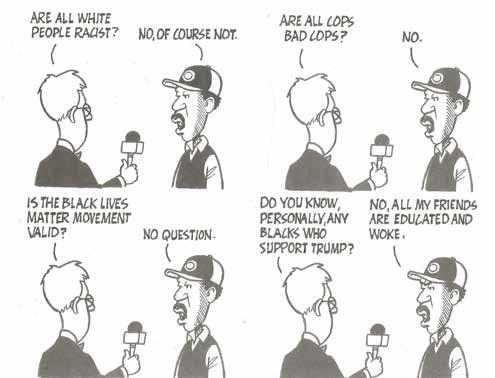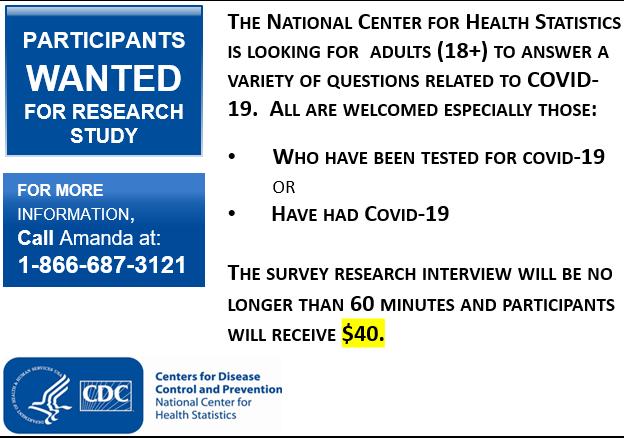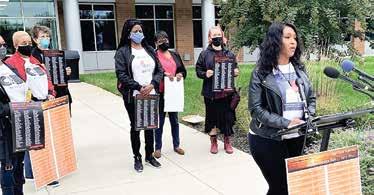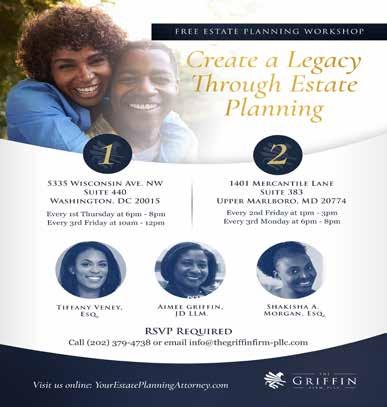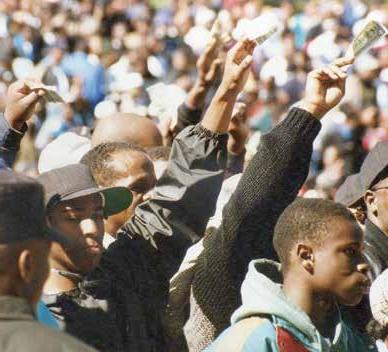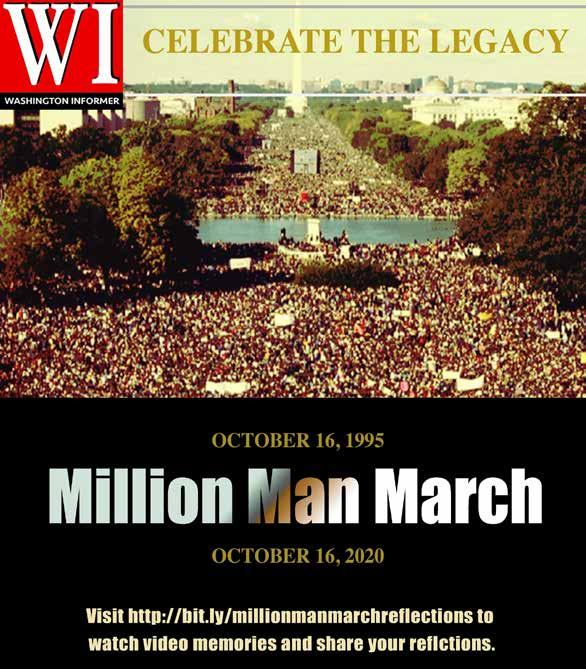
9 minute read
Business
Despite Many Obstacles, Blacks, Latinos Continue to Strive for, Believe in the American Dream
By Stacy M. Brown WI Senior Writer @StacyBrownMedia
As an African American and female attorney, Maria Barlow understands just how challenging it is to achieve the American dream.
A principal at The Barlow Law Firm in Chicago, the lawyer and mother of a young son, has faced many challenges inside and out of the courtroom.
“In my profession, there is inequality for women, especially minority women,” Barlow expressed.
“We have to work twice as hard to be considered half as good. Black women are not given the same respect as our counterparts. I have been stopped and questioned about why I am in court if I am the clerk, the court reporter, or the defendant.
“This does not happen to our counterparts, and when appearing before certain judges and hearing their comments, many clients feel they may need a male attorney, or even a white one.”
Despite the challenges, Barlow still believes in achieving the American Dream.
As a millennial, she isn’t alone.
Millennials and Generation Z members are optimistic about their future, and two-thirds believe the American Dream is achievable, according to an Echelon Insights study commissioned by the Walton Family Foundation.
Nearly half of young Americans expect to have a life better than their parents – with Black, Latino and Asian respondents reporting greater optimism.
The Walton Family survey compiled responses from more than 4,000 people, ranging in age from 13-23 (Generation Z) and 24-39 (Millennials).
Roughly 60 percent of Black Millennials and Generation Zers reported facing or expecting to meet racial inequality as a roadblock to opportunity.
“Despite the stereotypes, findings show these generations are engaged and passionate about building a better future,” Kristen Lynne Soltis Anderson, Republican pollster and co-founder of Echelon Insights, reported in a news release accompanying the survey.
“This means ensuring no paths are blocked, no doors are closed to someone because of where they were born or what they look like – everyone has a chance to build the life they want. That is the new American Dream.”
According to survey results, young Americans view the American Dream as having the freedom and opportunity to build the life they dream of on their terms.
Making this new American Dream a reality starts with education – eight in ten respondents believe having a high-quality education is very important to have a better life, but 43 percent say higher education is too expensive or hard to access.
Barlow, the youngest of 11 children, counts as the first in her family to complete college and go on to law school.
“My family couldn’t afford my education, so I am shackled with six-figure debt,” Barlow asserted. “Growing up, my mother stayed home with the kids while my father worked laying floors.
“Although my siblings didn’t go to college, many started businesses, and they own homes and cars. I think my parents did better than my grandparents and we have done better than our parents which is the goal. I’ve positioned my son and me to work twice as hard in order to compete while I’m hoping that a new spotlight on the disparities we face will make it easier for my son.”
Rohan Arora, a 19-year old activist, specializing in environmental health and minority experience and founder of the environmental health organization, The Community Check-Up, posited that young people are in a phase where they are working hard to secure many opportunities.
5 (Photo courtesy American Philanthropy News Digest)
Yet, minority youth and their communities still face environmental health instability that prevents them from focusing efforts toward attaining the American dream, Arora stated.
“Ever since I was a young boy, I have seen my immigrant family seek the American Dream. Whether that be securing an education or being able to speak one’s mind,” said Arora, who also serves as a climate activist advisor to the American Lung Association.
“Yet, they suffered a lot of explicit racism in their journey seeking the American dream. Although I am in a better position than minorities before me, I think there are still several challenges my generation faces,” Arora continued.
“One of the biggest issues I see today is environmental health injustice, which is a part of the larger race issue in our country today.”
While the hurdles are innumerable, Generation Z and Millennials have a winning spirit, opined Evy Valencia, chief of staff at 50CAN.
“We’re determined and strong as two groups separated by a sliver of time” Valencia declared.
“Our generations want to achieve change in the world, and we believe that change can and should happen in our lifetimes. The moment is polarized politically, but the resilience and dedication of these generations are something we should all celebrate.”
To view the entire survey, visit www. waltonfamilyfoundation.org. WI
If a loved one has passed away with HIV, we may be able to help.









When a loved one passes away, you may feel hopeless. When the person you loved was HIV positive, grieving can be even more difficult. We can help.
Your family may qualify for assistance if you have lost a loved one who:
• received a diagnosis of HIV, and • legally resided in D.C.; and • had less than $800 in liquid assets at the time of death To see if your family qualifies, contact
Samaritan Ministry’s Burial Assistance Coordinator:
202.889.7702 x 306
Mellon Foundation Launches Monuments Project Amid Unrest
By Sarafina Wright WI Contributing Writer
After a summer of racial injustice protests following the police-involved deaths of George Floyd and Breonna Taylor, contention over confederate monuments by opponents heightened, resulting in some being brought down or in some cases toppled in cities across the U.S.
In light of this, The Andrew W. Mellon Foundation is offering a remedy, of sorts.
The foundation last week announced the creation of “The Monuments Project,” the largest initiative in the organization’s 50-year history, to support the creation of new monuments, as well as the relocation or rethinking of existing ones.
“Statues are not just bodies in bronze, and monuments are not just stone pillars. They instruct. They lift up the stories of those who are seen, dominate the stories of those who are unseen, and too often propagate menacingly incomplete accounts of our country’s past,” the foundation writes.
The Monuments Project is a fiveyear, $250 million commitment by the Mellon Foundation to support
The Monuments Project is a five-year, $250 million commitment by the Mellon Foundation to support efforts to center national narratives to include those who have often been denied historical recognition.
efforts to center national narratives to include those who have often been denied historical recognition.
“This work has taken on greater urgency at a moment of national reckoning with the power and influence of memorials and commemorative spaces.”
The foundation President Elizabeth Alexander told The New York Times that the nonprofit will not itself recommend monuments for removal or rethinking. Instead, it will fund projects that are brought to it.
Grants made under the Monuments Project will fall under the following areas of activity: Fund new monuments, memorials, or historic storytelling spaces; contextualize existing monuments or memorials through installations, research, and education; and relocate existing monuments or memorials.
The foundation says its initiative will educate the public about our shared collective past to shape a more
5 In July, in Richmond Va., a photograph of Breonna Taylor was projected onto a statue of the Confederate general Robert E. Lee. (Photo courtesy of Jim Lo Scalzo/EPA, via Shutterstock)

just future. This comes after a June announcement that it was revising its mission to put a focus on social justice. “It will broaden our understanding of how we define commemorative spaces by including not only memorials, historical markers, public statuary, and permanent monuments but also storytelling spaces and ephemeral or temporary installations,” the foundation writes.
“The Monuments Project will transform the way our country’s histories are told in public spaces and ensure that future generations inherit a commemorative landscape that venerates and reflects the vast, rich complexity of the American story.” WI
LOOKING TO KEEP THINGS SIMPLE? START WITH FREE CHECKING AND PERSONAL SERVICE.

$100 BONUS* WHEN YOU OPEN A FREE CHECKING ACCOUNT
OPEN A SAVINGS OR MONEY MARKET ACCOUNT FOR $50 MORE*
Having quick, simple access to your bank account has never been more important. My Free Banking offers 24/7 online and mobile banking with no monthly fees or ongoing minimum balance requirement. You can also count on our dedicated bankers. That’s real banking for real life.
Call 800.399.5919 or visit
sandyspringbank.com/myfree
PERSONAL | BUSINESS | WEALTH | INSURANCE | MORTGAGE
*To receive the $100 bonus, open any checking account (excluding Student Banking) online or mention the offer when you call our client service center or visit our branches between September 1, 2020 and October 31, 2020, and establish direct deposit within 45 days of account opening. Initial direct deposit must be at least $500 and must continue for a minimum of 4 months (3 statement cycles after opening cycle). The direct deposit must originate from a paycheck, pension, social security or other monthly income electronically deposited. Transfers from one account to another or deposits made at the branch or ATM do not qualify as direct deposits. To receive the $50 savings bonus, open a savings or money market savings account at the same time the checking account is opened. A deposit of at least $300 is required to open the savings or money market account. Bonus will be deposited within 125 days of account opening, into the checking account meeting the bonus requirements. Account must be in good standing. All applicable taxes are the sole responsibility of the recipient. Limited time offer available only to individuals who currently do not have a personal checking account with Sandy Spring Bank or have not had one within the last 90 days. Offer subject to change and cancellation without notice and cannot be combined with any other offer. Member FDIC. Equal Housing Lender. Sandy Spring Bank NMLS # 406382. Wealth and Insurance products are not FDIC insured, not guaranteed, and may lose value. Sandy Spring Bank and the SSB logo are registered trademarks of Sandy Spring Bank. Real banking for real life.SM © 2020 Sandy Spring Bank. All rights reserved.

